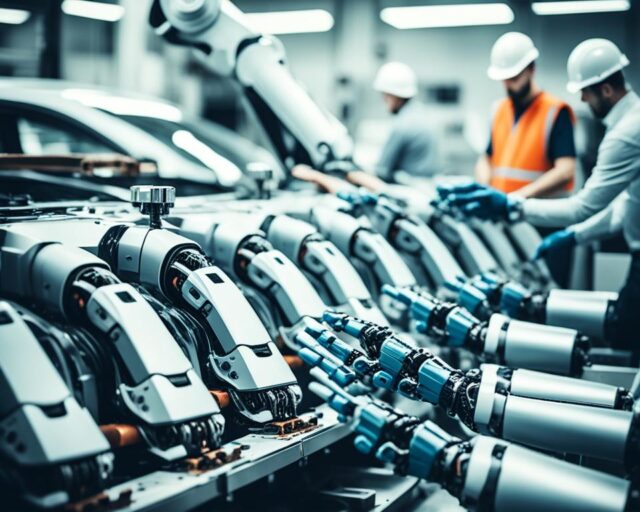Future of Work: Jobs vs. Automation with Scott Gallaway
“The future is not some place we are going to, but one we are creating. The paths are not to be found, but made. Making them changes both the maker and their destination.” – John Schaar
Welcome to a deep dive into the future of work with Scott Galloway, a well-known entrepreneur and writer. This article looks into how work is changing, the impact of machines doing our jobs, and the big challenges ahead. We're facing tech growth, debates on rules, and changing economies. It's key to think about how these shifts affect us.

Key Takeaways:
- As machines take over more tasks, we must create new roles and adapt.
- Scott Galloway shares insights on how work, tech, and society are intertwining.
- It's important to grasp social changes and policy chats about work for a fair future.
- Work is more than just making money. It shapes who we are and our happiness.
- We need to think carefully about AI's benefits and risks, and support those losing jobs.
The Changing Workforce
Galloway talks about the big shift of women getting jobs, with 56% of women working now versus just 10% in 1900. He mentions the difficulties in making this change a reality. This includes debates over pre-K, child tax credits, and school lunches. Galloway also talks about the fight for job access for different races, sexual orientations, and nationalities. He notes we've made progress but still have to fight against white patriarchy.
Women joining the workforce has changed society a lot. They've moved from home roles to vital ones in the work scene. This shows the gains in gender equality and empowers women. It also shows how big social changes can transform our world.
But, this change brings challenges. More women working means debates about things like affordable pre-K, child tax benefits for working moms, and better school lunches have come up. These discussions show how tough it is to fit this social change into our current systems.
“The changing workforce gives us new chances and hurdles. We must tackle the debates over work-life balance, equal pay, and affordable childcare. This will help women join the workforce fully and succeed,” Galloway states.
Galloway also mentions the ongoing struggles for work access for marginalized people. This includes issues tied to race, sexual orientation, and national origin. Progress has been made in removing these barriers. However, the battle against white patriarchy continues, and we need to keep working on it.
The Evolution of Work
Galloway looks at how work has changed, noting a big shift in the workforce. Fewer people work in manufacturing now, while more are in business services. This change reflects today's economy's needs, where automation and globalization challenge manufacturing.
Today, companies place great importance on technology. They spend a lot of their money on it. This shows they need advanced tools to get better, be productive, and innovate. Staying competitive in this digital world is crucial for them.
Galloway gives us a history lesson on work. At first, people hunted and gathered with low productivity. Then, with farming, people settled. The industrial revolution made manufacturing and mass production big. Now, we keep evolving with industrialization and digitization, shaping our work and skills needed.
The Changing Workweek
Galloway looks at how the workweek has changed. From long hours in the late 1800s to the 40-hour week in the early 20th century. This big change was a win for worker's rights and made life better for many.
Technology’s role in changing the workweek is huge. Because of tech, work and personal time mix more than ever. We get emails and messages any time, making work days longer.
Technology has changed how we work. It keeps us connected always. This is handy but it also means we work more.
Remote work has become more common, Galloway notes, especially after COVID-19. It lets people work from home, cutting down on travel and adding flexibility. Now, lots of companies try a mix of office and home work for a better balance.
Technology and automation raise questions about job security. Yet, while they might replace some jobs, they also make room for new chances to grow. Staying adaptable is key in this shift, as people need to learn new things and use new tech.
With ongoing tech progress, staying flexible and learning is a must. Keeping up with changes and new skills is crucial for success in any career.
The shift in the workweek due to tech and automation has good and bad sides. It's important for everyone, people and organizations, to think carefully about how it affects work-life balance, job safety, and happiness.
The Future of the Office
Galloway looks at how offices are changing due to technology. He talks about the office's history since the 18th century. He also thinks about how remote work and office work can mix in the future.
Remote work has its benefits, like more flexibility and a better balance between work and life. You can work from anywhere. But, there might be downsides, like lower pay and fewer chances to move up in your career.
Technology is key in changing offices. Galloway points out how new tools have changed our work life. Things like video calls and online project tools make teamwork and talking to each other easier.
But, remote work can lead to problems. Galloway talks about how it might affect how teams work together. It might limit how creative and innovative people can be. Yet, a mix of office and remote work could solve these issues.
As offices keep changing, Galloway tells companies to keep up. He says businesses should use new technology. This can make work places more efficient and productive.
The Meaning of Work
Galloway talks about the meaning of work. He says it's often viewed as bad or draining. Yet, he thinks work is key for economic security, relevance, and self-esteem.
Work lets us support ourselves and our loved ones, bringing economic security. It helps us meet basic needs and chase our dreams. Through work, we help society and find our purpose.
“Work is not just a means to an end; it is a fundamental part of who we are as individuals. It shapes our identity, gives us a sense of purpose, and allows us to make a difference in the world,”
It's key to set boundaries at work to keep a good work-life balance. Mixing work and personal life too much can make us burn out. It hurts our well-being. It's important to care for ourselves, set limits, and value leisure for personal joy and healthy relationships.
Work also makes us relevant in society. By improving our skills and keeping up with trends, we stay important in our jobs. Galloway tells young people to aim for wealth and influence at work. With this influence, they can help create social change and make our society better and fairer.
“Work not only provides us with a sense of purpose and fulfillment, but it also gives us the opportunity to make a real impact on the world around us,”
Work is vital for our self-esteem, too. It gives us a feeling of success, validates our skills, and boosts our confidence. Psychologically, work helps us feel good and satisfied in life.
As work changes, it's critical to see its true value in our lives. It's more than just surviving. Work offers chances for growth, self-expression, and meaningful contributions to society.
The Threat and Promise of AI
Artificial intelligence (AI) is key in the future of work and cannot be overlooked. Scott Galloway shares his concerns about tech decisions and lack of rules affecting society. He criticizes fearmongering about AI, focusing instead on real dangers from tech industry's amorality.
Galloway sees the need for safety nets and new chances for those who may lose jobs to AI. Some worry about job loss with AI's rise. But Galloway believes the real issue is the ethical choices of powerful people.
Galloway discusses AI's role in echo chambers and fake news spreading. He points out the need for rules to make AI safe and ethical for everyone's good.
“The key lies in striking the right balance between technological advancements and human welfare, leveraging AI as a powerful tool to augment human capabilities rather than replacing them.”
Galloway talks about taking steps like making ethical guides and regulation to limit AI's bad effects. He also supports helping people gain new skills for the evolving job market.
It's vital to use AI to improve society. Recognizing AI's dangers and focusing on ethical use can reveal its benefits. With proper regulation and a focus on human welfare, AI can change industries and help people.
Conclusion
Scott Galloway talks about the future of work and how important artificial intelligence (AI) is. He wants us to be ready for the changes AI will bring to jobs. Galloway says we need to think about how to make things fair for everyone with AI changing jobs.
He suggests making strong support systems for people who lose their jobs because of AI. Work is more than just a job. It gives us meaning, helps the economy, and makes society better. Galloway believes we must adapt and always think about the well-being of society.
Galloway dreams of a future where AI and humans work together well. He calls on leaders and governments to face AI's challenges and ethics together. He thinks with the right rules and policies, we can use technology for good. This way, we can create a future that's good for all, making society fair and strong.














